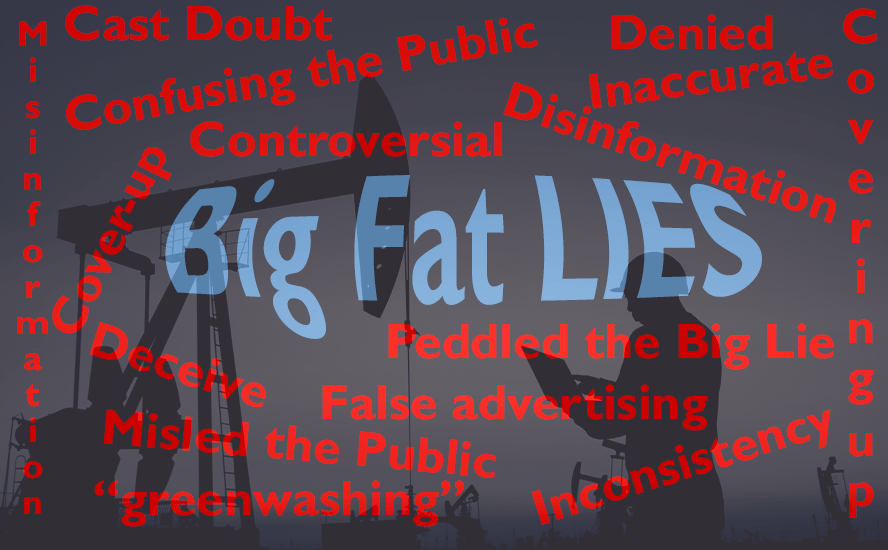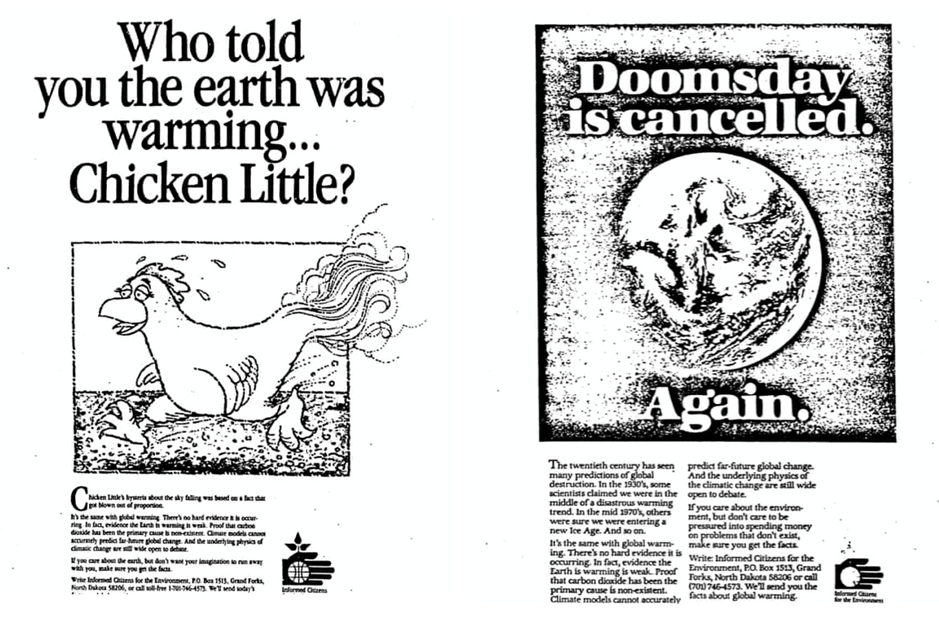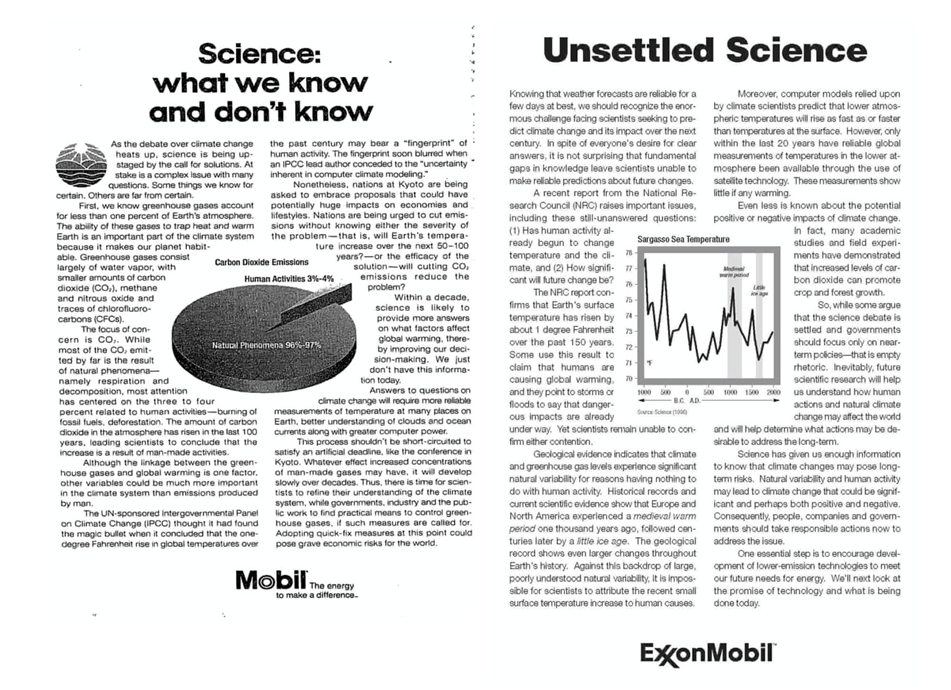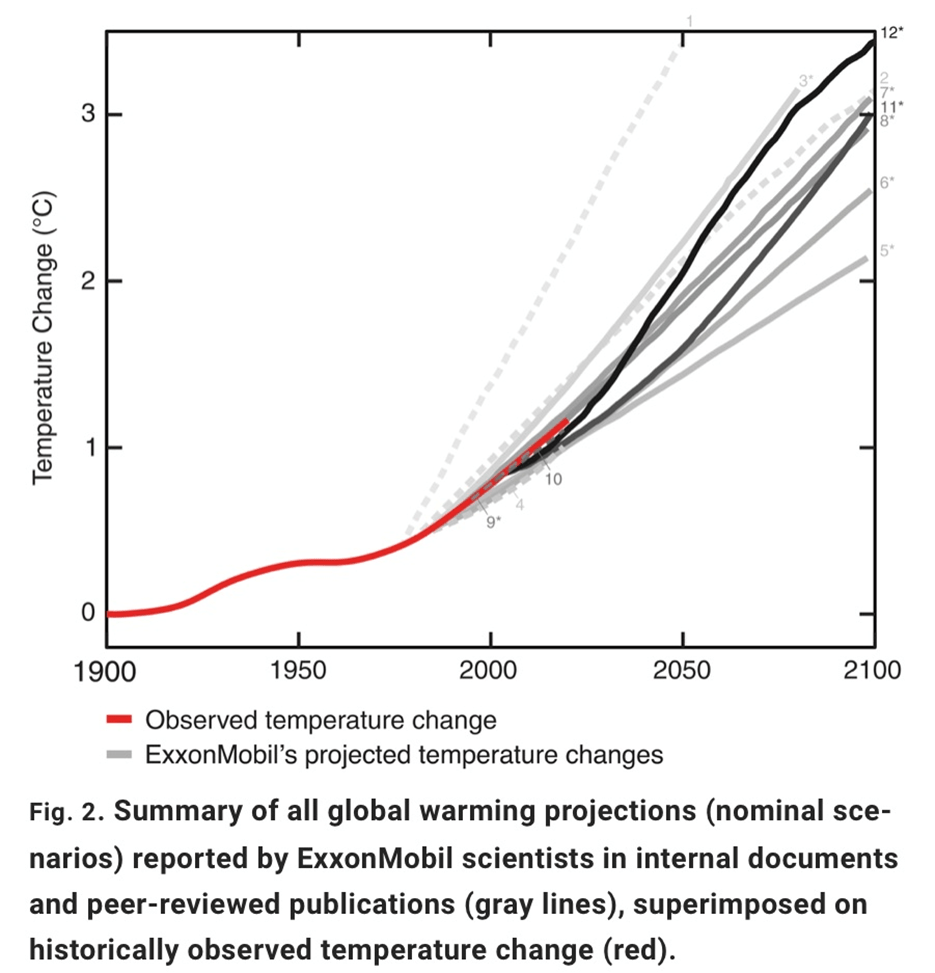
Rick Mills – “The Big Fat Lies Told by Big Oil, Big Plastic”
While there is disagreement over its causes, the reality of global warming is an incontrovertible fact. The planet is heating up, affecting our weather, oceans and food, as crops fail, causing shortages and price hikes. Storms are becoming more frequent and more intense. Droughts are lasting longer. Longer and hotter heat waves and much more intense forest fires are now becoming annual summer occurrences.
Global heat records keep getting smashed, as a combination of global warming and El Nino cook the Earth’s surface and warm its oceans, affecting marine life and causing extreme weather, including heat waves, atmospheric rivers of rain and hurricanes.
Our dystopian future is already here
It was the hottest February ever, marking the ninth straight month that global heat records have fallen, CNN reported on Wednesday, March 6.
In the North Atlantic, a new daily temperature record has been set every day since March 5, 2023.
Climate change lie
In October 2021 the heads of some of the largest oil companies were called to testify before a congressional hearing on the companies’ role in climate disinformation.
The hearing was triggered by the release of an undercover video of an Exxon lobbyist detailing the company’s lobbying efforts against climate change. (NBC News, Oct. 28, 2021)
Committee members compared oil majors like Exxon, Chevron, Shell and BP America to Big Tobacco, which for years misled the public on the dangers of smoking.
Despite being under oath and facing harsh questioning, the chief executives denied they covered anything up.
When the committee confronted Exxon’s CEO Darren Woods with documents showing Exxon scientists acknowledged that burning of fossil fuels would cause climate change, even as the company leader at the time was calling the link “inconclusive”, Woods testified “I do not agree there was an inconsistency. As science has developed, our science has developed.”
Others said they acted in good faith to cut emissions and were merely following the science at the time, the NBC News article stated.
The CEOs instead tried to steer the discussion into what steps they have taken voluntarily to deal with global warming, but Democrats on the panel reportedly dismissed these as “greenwashing”.
The Guardian newspaper the same year published an article about the advertising designed and employed by the fossil fuel industry to cast doubt on the science of climate change.
The British newspaper says The fossil fuel industry has perpetrated a multi-decade, multibillion dollar disinformation, propaganda and lobbying campaign to delay climate action by confusing the public and policymakers about the climate crisis and its solutions. This has involved a remarkable array of advertisements – with headlines ranging from “Lies they tell our children” to “Oil pumps life” – seeking to convince the public that the climate crisis is not real, not human-made, not serious and not solvable. The campaign continues to this day.
Source: Informed Citizens for the Environment, 1991
Sources: Left — New York Times, 1997; Right — New York Times, Wall Street Journal and other publications, 2000
False advertising is among a list of allegations against Big Oil in a lawsuit filed recently in California. The 135-page suit argues some of the world’s largest oil and gas companies — Exxon Mobil, Shell, Chevron, ConocoPhillips and BP — deceived the public about the risks of fossil fuels. It seeks a compensation fund to pay for future damages caused by climate-related disasters in California. (CBC News, Sept. 21, 2023)
California is among two dozen cities and states that have sued the oil industry in recent years for covering up the dangers of climate change.
The suit says the oil companies misled the public about what the industry’s own research showed about the impact of fossil fuel emissions, and that they delayed the transition to renewable energy. It claims oil and gas executives knew about the warming effects of greenhouse gas emissions as early as the 1950s, but made efforts to “cast doubt in the public’s mind about the burgeoning scientific consensus on climate change.”
For examples, CBC states:
- In 1979, an internal Exxon memostated increasing CO2 concentration will “cause a warming of the Earth’s surface” and the “present trend of fossil fuel consumption will cause dramatic environmental effects before the year 2050. The potential problem is great and urgent.”
- In 1998, the American Petroleum Institute (API), also named in the suit, convened an organization known as the Climate Science Communications Team(GCSCT), whose members included oil company employees and no climate scientists. The goal, according to a memo, was to develop and implement “a national media relations program to inform the media about uncertainties in climate science” and “begin to erect a barrier against further efforts to impose Kyoto [Protocol]-like measures in the future.”
What Exxon knew
Just over a year ago, United Nations Secretary General Antonio Guterres said some big oil companies ignored their own science about the dangers of climate change and “peddled the big lie” for decades about the safety of burning fossil fuels. (Aljazeera, Jan. 19, 2023).
Guterres referenced a 2015 investigation by InsideClimateNews that found Exxon Mobil, currently the world’s fourth largest oil company by revenue, was aware of climate change as early as 1977, before it became a public issue.
A 2015 article in Scientific American stated:
This knowledge did not prevent the company from spending decades refusing to publicly acknowledge climate change and even promoting climate misinformation—an approach many have likened to the lies spread by the tobacco industry regarding the health risks of smoking…
Exxon didn’t just understand the science, the company actively engaged with it. In the 1970s and 1980s it employed top scientists to look into the issue and launched its own ambitious research program that empirically sampled carbon dioxide and built rigorous climate models. Exxon even spent more than $1 million on a tanker project that would tackle how much CO2 is absorbed by the oceans. It was one of the biggest scientific questions of the time, meaning that Exxon was truly conducting unprecedented research.
In their eight-month-long investigation, reporters at InsideClimate News interviewed former Exxon employees, scientists and federal officials and analyzed hundreds of pages of internal documents. They found that the company’s knowledge of climate change dates back to July 1977, when its senior scientist James Black delivered a sobering message on the topic. “In the first place, there is general scientific agreement that the most likely manner in which mankind is influencing the global climate is through carbon dioxide release from the burning of fossil fuels,” Black told Exxon’s management committee. A year later he warned Exxon that doubling CO2 gases in the atmosphere would increase average global temperatures by two or three degrees—a number that is consistent with the scientific consensus today. He continued to warn that “present thinking holds that man has a time window of five to 10 years before the need for hard decisions regarding changes in energy strategies might become critical.” In other words, Exxon needed to act…
in June 1988, when NASA scientist James Hansen told a congressional hearing that the planet was already warming, Exxon remained publicly convinced that the science was still controversial. Furthermore, experts agree that Exxon became a leader in campaigns of confusion. By 1989 the company had helped create the Global Climate Coalition (disbanded in 2002) to question the scientific basis for concern about climate change. It also helped to prevent the U.S. from signing the international treaty on climate known as the Kyoto Protocol in 1998 to control greenhouse gases. Exxon’s tactic not only worked on the U.S. but also stopped other countries, such as China and India, from signing the treaty. At that point, “a lot of things unraveled,” Oreskes says.
Source: Science.org
In early 2023 the journal ‘Science’ reported:
For decades, some members of the fossil fuel industry tried to convince the public that a causative link between fossil fuel use and climate warming could not be made because the models used to project warming were too uncertain. Supran et al. show that one of those fossil fuel companies, ExxonMobil, had their own internal models that projected warming trajectories consistent with those forecast by the independent academic and government models. What they understood about climate models thus contradicted what they led the public to believe. —HJS
A 2017 Harvard University study concluded that Exxon knew about the damaging effects of climate change for nearly 40 years, yet did nothing to inform the public nor change its oil and gas extraction business model it knew would, at the very least, accelerate global warming. Had it changed course then, and its Big Oil competitors followed suit, we may not find ourselves in the predicament we are in now – with less than a decade left to stop the planet from warming beyond the point of no return.
The Harvard study wanted to know how much the oil major has known about climate change over the past several decades.
The results found that Exxon publicly questioned the dangers of climate change despite scientists and executives employed by the company acknowledging the growing threat internally.
“We conclude that ExxonMobil misled the public,” the researchers wrote in the peer-reviewed study reported on by CNN Money. Exxon dismissed the study as inaccurate, paid for and written by activists. The study looked at 187 public and private communications from Exxon about climate change between 1977 and 2014. It found the more public the communication to the public was, such as advertorials, the more doubt Exxon expressed about climate change, according to CNN. By contrast, 80% of internal communications acknowledged that global warming is both real and human-caused, versus just 12% of opinion editorials published in the New York Times.
In May 2017, 63% of Exxon’s shareholders supported a proposal to disclose how the changing climate could hurt the company. In September 2017 the cities of San Francisco and Oakland sued Exxon and other oil companies, demanding that they pay billions to cover the costs of sea walls and other structures to prevent rising sea levels caused by climate change. In 2018 a federal judge dismissed the oil giant’s lawsuit trying to stop New York and Massachusetts from doing the same thing as the Harvard study, probing to see whether it covered up knowledge of climate change and lied to investors and the public about it.
Recycling lie
The public was also sold a big fat lie over recycling.
Since the 1970s, North Americans have been taught that most plastic is recyclable. The circular arrows symbol was invented by the plastics industry to indicate a product’s recyclability, however the secret they didn’t want us to know about, was that few plastics are actually recycled; the rest, such as mixed plastics (e.g. food wrappers, plastic film) are often landfilled or incinerated because it isn’t economical to recycle them.
In fact, it is often cheaper to make “virgin” plastic than to recycle it.
The CBC documentary ‘Plastic Wars’ describes how the plastics industry spent millions promoting recycling just to sell more plastic.
NPR and US-based documentary filmmaker PBS ‘Frontline’ also investigated the plastics industry, and in 2020 released their results. NPR’s Sept. 11, 2020 article states:
We found that the industry sold the public on an idea it knew wouldn’t work — that the majority of plastic could be, and would be, recycled — all while making billions of dollars selling the world new plastic.
The industry’s awareness that recycling wouldn’t keep plastic out of landfills and the environment dates to the program’s earliest days.
“There is serious doubt that [recycling plastic] can ever be made viable on an economic basis,” one industry insider wrote in a 1974 speech.
Yet the industry spent millions telling people to recycle, because, as one former top industry insider told NPR, selling recycling sold plastic, even if it wasn’t true.
A new report confirms that plastic producers have known for 30-plus years that recycling is not economically or technically feasible as a plastic waste management solution, yet continued to promote it.
“The companies lied,” said Richard Wiles, president of the Center for Climate Integrity (CCI), which published the report. “It’s time to hold them accountable for the damage they’ve caused.”
“Fossil fuel and other petrochemical companies have used the false promise of plastic recycling to exponentially increase virgin plastic production over the last six decades, creating and perpetuating the global plastic waste crisis and imposing significant costs on communities that are left to pay for the consequences.”
— ‘The Fraud of Plastic Recycling: How Big Oil and the plastics industry deceived the public for decades and caused the plastic waste crisis’ by The Center For Climate Integrity
In The Guardian’s article on the report, it states that plastics are notoriously hard to recycle. They require meticulous sorting because most of the chemically distinct varieties of plastic cannot be recycled together. This makes the process expensive. Another challenge is the material degrades each time it’s recycled, meaning it can only be re-used once or twice.
The CCI report shows the industry knew about these problems for decades, but obscured that information in its marketing campaigns.
It suggests the plastics industry could face legal action, having broken laws designed to protect the public from misleading marketing and pollution.
Ironically, there probably wouldn’t be any plastics recycling if it wasn’t for the plastics industry. The movement started in the 1980s when plastic producers started getting negative feedback about plastic waste.
In response to threats by municipalities to ban plastic bags and other plastic products — which would resurface and actually became laws in many cities now, 40 years later — the industry began promoting recycling as a solution to the plastic waste problem.
The trade group the Plastics Recycling Foundation was established in 1984. Four years later, the foundation came up with the now-familiar “chasing arrows” recycling symbol.
The Guardian states, Experts have long said the symbol is highly misleading, and recently federal regulators have echoed their concerns.
According to the CCI report, the industry has known since the mid-‘80s that recycling is not economically or practically viable. Again via The Guardian:
An internal 1986 report from the trade association the Vinyl Institute noted that “recycling cannot be considered a permanent solid waste solution [to plastics], as it merely prolongs the time until an item is disposed of”.
In 1989, the founding director of the Vinyl Institute told attendees of a trade conference: “Recycling cannot go on indefinitely, and does not solve the solid waste problem.”…
In 1994, a representative of Eastman Chemical spoke at an industry conference about the need for proper plastic recycling infrastructure. “While some day this may be a reality,” he said, “it is more likely that we will wake up and realize that we are not going to recycle our way out of the solid waste issue.” That same year, an Exxon employee told staffers at the American Plastics Council: “We are committed to the activities [of plastics recycling], but not committed to the results.”
Big Plastic responded to the CCI report by saying it was created by an anti-recycling organization and that it disregards investments made in recycling technology.
The technology has certainly improved. Some municipalities are better than others at sorting and recycling plastic.
RecycleBC is considered a North American leader in recycling; the organization running the province’s residential recycling programs processes 90% of the materials it collects.
On average, however, only 78% of products manufacturers create are recovered to be processed. Paper and glass have the highest recovery rate while only 46% of all plastic materials are recovered. (CBC News, June 27, 2021)
Conclusion
Nobody likes a liar, especially when the lie has consequences. Unfortunately, we have not been told the truth about fossil fuels’ role in climate change, even though the evidence was available to the big oil companies as early as the 1970s — well before anyone had heard of global warming or the greenhouse effect.
If Big Oil had a social conscience, they would have shared their research. Instead, they kept it to themselves, in what is arguably one of the biggest and worst corporate cover-ups. Imagine how much further we’d be in making the transition from fossil fuels to electrics, if it had started in the 1980s? We need to moderate our use of fossil fuels as much as practical and severely punish corporations who deliberately lied to us, and deceived us over the use of fossil fuels at the expense of our health and the environment.
The same goes for plastic pollution and Big Plastic. Plastic was first sold to the public in the 1950s as a convenient, safe, disposable product. People loved that you could use it once and simply chuck it away, with seemingly no consequences.
Big Plastic needed to placate the masses and recycling seemed like a good way to do it. If plastic (and other materials, like paper and glass), can be recycled, why bother using less? The problem is that very little plastic is recycled — an estimated 10% — with the rest ending up in landfills, rivers, lakes and finally, the ocean.
Plastic pollution: a scourge with far-reaching consequences
Tiny particles shed from thousands, maybe millions of plastic items are getting into the soil, the water, the air and the food chain.
We are now eating, breathing and drinking plastic. Recent research shows that microplastics cause cancer and that they may even have an impact on fertility.
We need to figure out a way to get plastic out of our air, soil and water. Recycling better, using less plastic, and introducing alternative products to plastic that degrade more easily in a compostable environment are three options. We’ll examine the third one in a later article.
Legal Notice / Disclaimer
Ahead of the Herd newsletter, aheadoftheherd.com, hereafter known as AOTH.
Please read the entire Disclaimer carefully before you use this website or read the newsletter. If you do not agree to all the AOTH/Richard Mills Disclaimer, do not access/read this website/newsletter/article, or any of its pages. By reading/using this AOTH/Richard Mills website/newsletter/article, and whether you actually read this Disclaimer, you are deemed to have accepted it.
Any AOTH/Richard Mills document is not, and should not be, construed as an offer to sell or the solicitation of an offer to purchase or subscribe for any investment.
AOTH/Richard Mills has based this document on information obtained from sources he believes to be reliable, but which has not been independently verified.
AOTH/Richard Mills makes no guarantee, representation or warranty and accepts no responsibility or liability as to its accuracy or completeness.
Expressions of opinion are those of AOTH/Richard Mills only and are subject to change without notice.
AOTH/Richard Mills assumes no warranty, liability or guarantee for the current relevance, correctness or completeness of any information provided within this Report and will not be held liable for the consequence of reliance upon any opinion or statement contained herein or any omission.
Furthermore, AOTH/Richard Mills assumes no liability for any direct or indirect loss or damage for lost profit, which you may incur as a result of the use and existence of the information provided within this AOTH/Richard Mills Report.
You agree that by reading AOTH/Richard Mills articles, you are acting at your OWN RISK. In no event should AOTH/Richard Mills liable for any direct or indirect trading losses caused by any information contained in AOTH/Richard Mills articles. Information in AOTH/Richard Mills articles is not an offer to sell or a solicitation of an offer to buy any security. AOTH/Richard Mills is not suggesting the transacting of any financial instruments.
Our publications are not a recommendation to buy or sell a security – no information posted on this site is to be considered investment advice or a recommendation to do anything involving finance or money aside from performing your own due diligence and consulting with your personal registered broker/financial advisor.
AOTH/Richard Mills recommends that before investing in any securities, you consult with a professional financial planner or advisor, and that you should conduct a complete and independent investigation before investing in any security after prudent consideration of all pertinent risks. Ahead of the Herd is not a registered broker, dealer, analyst, or advisor. We hold no investment licenses and may not sell, offer to sell, or offer to buy any security.
MORE or "UNCATEGORIZED"
Surge Copper Announces Closing of First Tranche of $20 Million Private Placement
Surge Copper Corp. (TSX-V: SURG) (OTCQB: SRGXF) (Frankfurt: G6D2) is pleased to announce that it has... READ MORE
Spanish Mountain Gold Drilling Intersects 205.87 Metres Grading 0.58 G/T Gold, 142.00 Metres of 0.77 G/T Gold, and 69.40 Metres of 0.99 G/T Gold in Three Separate Drill Holes Containing Numberous Higher-Grade Sub-Intervals
Spanish Mountain Gold Ltd. (TSX-V: SPA) (FSE: S3Y) (OTCQB: SPAUF) is pleased to report additi... READ MORE
Aura Signed the Agreement to Relocate Road at Borborema Mine, Unlocking an additional 670 Koz of gold in Mineral Reserves, totaling 1.5 Moz
Aura Minerals Inc. (Nasdaq: AUGO) (B3: AURA33) is pleased to announce that it has signed the agreem... READ MORE
Aura Announces Q4 2025 and FY 2025 Financial and Operational Results
Aura Minerals Inc. (NASDAQ: AUGO) (B3: AURA33) announces that it has filed its audited consolidated ... READ MORE
Endeavour Silver Announces Q4 2025 Financial Results; Earnings Call at 10AM PST (1PM EST) Today
Endeavour Silver Corp. (NYSE: EXK) (TSX: EDR) announces its financial and operating results ... READ MORE
















